Echo CS-310 User Manual
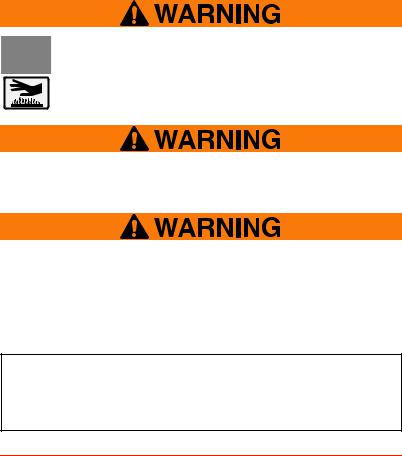
CS-310
CHAIN SAW
Instruction Manual
Burn Hazard
The muffler or catalytic muffler and surrounding cover may become extremely hot. Always keep clear of exhaust and muffler area, otherwise serious personal injury may occur.
The engine exhaust from this product contains chemicals known to the State of California to cause cancer, birth defects, or other reproductive harm.
Users of this equipment risk injury to themselves and others if the unit is used improperly and/or safety precautions are not followed. Echo provides and operator’s manual and a safety manual. Both must be read and understood for proper
and safe operation. Failure to do so could result in serious injury.
Specifications, descriptions and illustrative material in this literature are as accurate as known at the time of publication, but are subject to change without notice. Illustrations may include optional equipment and accessories, and may not include all standard equipment.
X7503275300
© 1/2017 ECHO Inc.

TABLE OF CONTENTS |
CS-310 |
|
|
TABLE OF CONTENTS
Table of Contents ........................................................................................ |
2 |
||
Packing List................................................................................................. |
4 |
||
Safety .......................................................................................................... |
5 |
||
Rules For Safe Operation .................................................................... |
5 |
||
Correct Use Of Chain Brake ................................................................ |
6 |
||
Personal Condition and Safety Equipment ........................................ |
11 |
||
International Symbols ........................................................................ |
15 |
||
Manual Safety Symbols and Important Information |
........................... 16 |
||
Emission Control (Exhaust & Evaporative) .............................................. |
18 |
||
CARB And EPA Emissions Control Information................................. |
18 |
||
Description ................................................................................................ |
19 |
||
Preparation For Use........................................................................... |
21 |
||
Operation .................................................................................................. |
24 |
||
Fuel.................................................................................................... |
24 |
||
Chain Lubricant.................................................................................. |
26 |
||
Winter Operation................................................................................ |
28 |
||
Starting Cold Engine.......................................................................... |
28 |
||
Starting Warm Engine........................................................................ |
30 |
||
Running ............................................................................................. |
30 |
||
Stopping............................................................................................. |
31 |
||
Checking Chain Tension .................................................................... |
32 |
||
Chain Lubrication Test ....................................................................... |
32 |
||
Cutting Instructions ............................................................................ |
32 |
||
Chain And Guide Bar Combination.................................................... |
37 |
||
Guide Bar........................................................................................... |
38 |
||
Saw Chain.......................................................................................... |
38 |
||
Maintenance ............................................................................................. |
39 |
||
Skill Levels ......................................................................................... |
39 |
||
Maintenance Intervals........................................................................ |
39 |
||
Carburetor Adjustment....................................................................... |
40 |
||
Air Filter ............................................................................................. |
42 |
||
Spark Plug ......................................................................................... |
42 |
||
Check Fuel System............................................................................ |
42 |
||
Fuel Filter........................................................................................... |
43 |
||
Oil Filter ............................................................................................. |
43 |
||
Guide Bar........................................................................................... |
44 |
||
Sprocket............................................................................................. |
44 |
||
Cooling System Cleaning................................................................... |
44 |
||
Spark Arrestor Muffler........................................................................ |
44 |
||
Spark Arrestor Screen ....................................................................... |
45 |
||
Exhaust Port Cleaning ....................................................................... |
45 |
||
Setting The Saw Chain ...................................................................... |
47 |
||
2 |
|
|
X7503275300 |
© 1/2017 ECHO Inc.

CS-310 |
TABLE OF CONTENTS |
Troubleshooting ............................................................................... |
......... 49 |
Storage ..................................................................................................... |
50 |
Storage After Use .............................................................................. |
50 |
Specifications ........................................................................................... |
51 |
Product Registration ........................................................................... |
...... 52 |
Servicing Information................................................................................ |
58 |
Parts/Serial Number .......................................................................... |
58 |
Service .............................................................................................. |
58 |
Echo Consumer Product Support...................................................... |
58 |
Product Registration .................................................................... |
...... 58 |
Additional or Replacement Manuals.................................................. |
59 |
X7503275300 |
|
3 |
© 1/2017 ECHO Inc.

PACKING LIST |
CS-310 |
PACKING LIST
The ECHO product you purchased has been factory pre-assembled for your convenience. Due to packaging restrictions, some assembly may be necessary.
After opening the carton, check for damage. Immediately notify your retailer or ECHO Dealer of damaged or missing parts. Use the contents list to check for missing parts.
____ 1 - Power Head
____ 1 - Instruction Manual
____ 1 - Safety Manual
____ 1 - Warranty Statement
____ 1 - Echo Power Blend X™
2-Stroke Oil Sample
____ 1 - Guide bar
____ 1 - Saw chain
____ 1 - Tip Guard Assembly
4 |
|
X7503275300 |
© 1/2017 ECHO Inc.
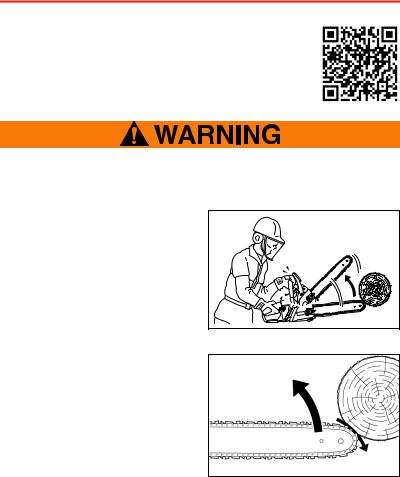
CS-310 |
SAFETY |
|
|
SAFETY
Rules For Safe Operation
Kickback Safety Precautions for Chain Saw Users
KICKBACK may occur when the nose or tip of the guide bar touches an object, or when the wood closes in and pinches the saw chain in the cut.
Tip contact in some cases may cause |
Rotational kickback |
a lightning fast reverse REACTION, |
|
Kicking the guide bar up and back |
|
towards the operator. Pinching the |
|
saw chain along the top of the guide |
|
bar may push the guide bar rapidly |
|
back towards the operator. Either of |
|
these reactions may cause you to |
|
lose control of the saw which could |
|
result in serious personal injury. |
|
The tip guard device is not installed on the guide bar when you purchase your chain saw. The tip guard can be used in a majority of cutting operations, and is especially recommended for beginners, homeowners, or chain saw novices. Most cutting operations can be accomplished with the tip guard in place.
Rotational kickback
Chain moving downward at impact
Do not rely exclusively upon the safety devices built into your saw. As a chain saw user, you should take several steps to keep your cutting jobs free from accident or injury.
X7503275300 |
|
5 |
© 1/2017 ECHO Inc.
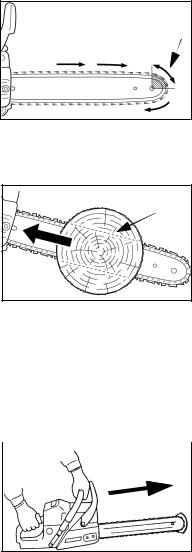
SAFETY |
CS-310 |
|
|
1.With a basic understanding of
kickback, you can reduce or |
Kickback Danger Zone |
eliminate the element of surprise. |
|
Sudden surprise contributes to |
|
accidents. |
|
2.Keep a good firm grip on the saw with both hands, the right hand on the rear handle, and the left hand on the front handle, when the engine is running. Use a firm
grip with thumbs and fingers encircling the chain saw handles. A firm grip will help you reduce kickback and maintain control of the saw. Don’t let go.
3.Make sure that the area in which
you are cutting is free from |
Linear kickback |
|
Pinch |
||
obstructions. Do not let the nose |
||
|
||
of the guide bar contact a log, |
|
|
branch, or any other obstruction |
|
|
which could be hit while you are |
|
|
operating the saw. |
Kickback |
|
|
4.Cut at high engine speeds.
5.Do not overreach or cut above shoulder height.
6.Follow manufacturer’s sharpening and maintenance instructions for the saw chain.
7.Only use replacement bars and chains specified by the manufacturer or the equivalent.
Correct Use Of Chain Brake
Chain Brake Operation |
Locked |
|
|
• Set the lever in the unlocked |
|
position before starting to cut. |
|
•If the brake is tripped by kickback reaction, the chain will stop immediately. Release the throttle to avoid possible damage to the engine or clutch.
•Do not attempt to operate the engine with the brake locked.
6 |
|
X7503275300 |
© 1/2017 ECHO Inc.
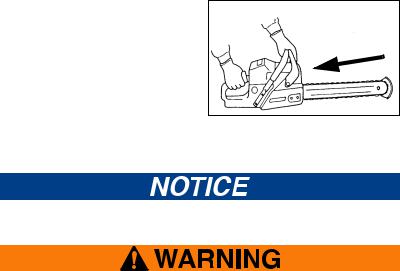
CS-310 |
SAFETY |
|
|
Testing The Brake
Unlocked
•Start the engine on a solid level surface and run at a fast idle until warm.
•Hold the saw firmly by the handles and accelerate the engine to a fast idle.
•Slowly operate the chain brake
lever while holding the saw firmly on the ground. When the brake lever trips, the chain should stop. Immediately release the throttle trigger.
Do not allow the saw to tip forward in order to avoid damage to the chain.
If the chain does not stop immediately, return the saw to your authorized dealer for repair.
Note:
•For practice, while cutting a small tree, push the lever forward to lock the brake.
•Confirm that the brake works properly before each use.
•If the chain brake is clogged with wood chips, function of the brake may deteriorate. Always keep the device clean.
•Do not increase engine RPM's while the chain brake is locked.
The installation of a chain brake may be mandatory by law or as stipulated by insurance regulations in your area of operation. You should inquire through local government offices, your employer or your local dealer to ensure that your chain saw conforms to the required safety standard.
Chain brakes have been designed and tested to comply with international safety standards as follows.
USA: ANSI Standard B175.1 Safety Requirement for chain saws
X7503275300 |
|
7 |
© 1/2017 ECHO Inc.
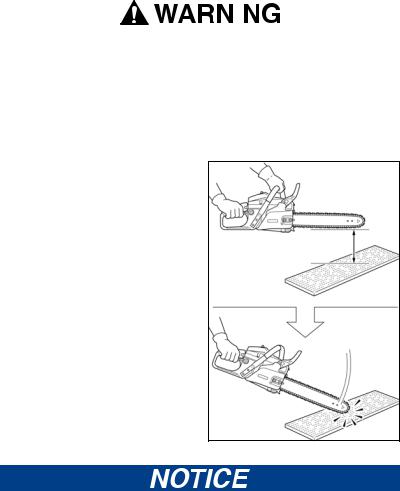
SAFETY |
CS-310 |
|
|
|
|
|
|
|
|
ANSI Standard B175.1 stipulates that the brake shall stop the chain 0.12 seconds at an engine speed of 13,500 r/min. It is the responsibility of the owner/operator to ensure that the brake is serviced, adjusted and tested strictly in accordance with the instructions as detailed here in order to ensure that the brake performance is maintained in compliance with the Standard B175.1.
Automatic Chain Brake |
|
Kickback produced from the tip of the |
|
guide bar will trip the automatic chain |
|
brake. To make sure that the |
|
automatic chain brake operates |
35 cm |
properly, follow these steps: |
|
|
(14 in.) |
1.Stop the engine.
2.Hold the saw with the guide bar approximately 35 cm (14 in.) above a wooden surface. Right hand should hold the rear handle, and left hand should hold the front handle.
3.Release the front handle and drop the end of the guide bar against the wooden surface.
4.The impact should lock the chain brake.
When checking the operation of the automatic chain brake, use a soft surface substance like wood to absorb the impact so the chain is not damaged.
Other Safety Precautions
1.Do not operate a chain saw with one hand! Serious injury to the operator, helpers, bystanders, or any combination of these persons may result from one-handed operation. A chain saw is intended for twohanded use.
2.Do not operate a chain saw when you are fatigued.
8 |
|
X7503275300 |
© 1/2017 ECHO Inc.
CS-310 |
SAFETY |
|
|
3.Use safety footwear, snug-fitting clothing and protective gloves. Wear eye, hearing, and head protection devices.
4.Use caution when handling fuel. Move the chain saw at least 3 m (10 feet) from the fueling point before starting the engine.
5.Do not allow other persons to be near the chain saw when starting or cutting with the chain saw. Keep bystanders and animals out of the work area.
6.Do not start cutting until you have a clear work area, secure footing, and a planned retreat path from the falling tree.
7.Keep all parts of your body away from the saw chain when the engine is running.
8.Before you start the engine, make sure that the saw chain is not contacting anything.
9.Carry the chain saw with the engine stopped, the guide bar and saw chain to the rear, and the muffler away from your body.
10.Do not operate a chain saw that is damaged, improperly adjusted, or not completely and securely assembled. Be sure that the saw chain stops moving when the throttle control trigger is released.
11.Shut off the engine before setting the chain saw down.
12.Use extreme caution when cutting small size brush and saplings because slender material may catch the saw chain and be whipped toward you or pull you off balance.
13.When cutting a limb that is under tension, be alert for spring-back so that you will not be struck when the tension in the wood fibers is released.
14.Keep the handles dry, clean, and free of oil or fuel mixture.
15.Operate the chain saw only in well ventilated areas.
16.Do not operate a chain saw in a tree unless you have been specifically trained to do so.
17.All chain saw service, other than items listed in the Instruction manual maintenance instructions, should be performed by competent service personnel. (For example, if improper tools are used to remove the flywheel or if an improper tool is used to hold the flywheel in order to remove the clutch, structural damage to the flywheel could occur and could subsequently cause the flywheel to burst.)
18.When transporting your chain saw, use the appropriate guide bar scabbard.
19.A spark arrestor muffler approved to SAE Standard J335 is standard on this chain saw to reduce the possibility of forest fires. Do not operate the chain saw with a loose or defective muffler. Do not remove the spark arrestor screen.
X7503275300 |
|
9 |
© 1/2017 ECHO Inc.
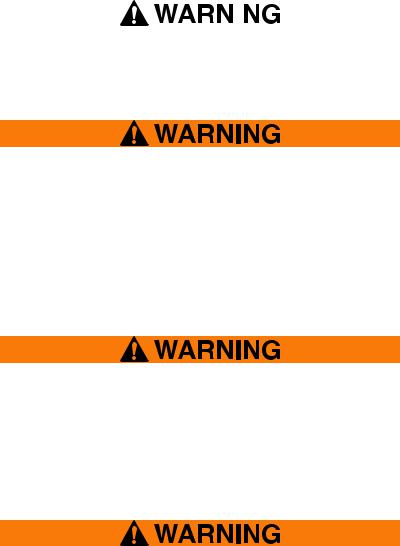
SAFETY |
CS-310 |
|
|
|
|
|
|
|
|
Chain saws shall be used in accordance with the operating instructions and safety precautions listed in the operator's manual(s). It shall be the responsibility of the owner to see that such instructions and precautions are given to every operator who uses the saw.
During operation, the muffler or catalytic muffler and surrounding cover become hot.
Never suspend the saw on a lanyard with the engine running.
Always use the saw from the right-hand side of your body – NEVER from the left side.
Always wear proper safety clothing to protect your lower body from sharp saw chain and hot muffler.
Always keep exhaust area clear of flammable debris during transportation or when storing, otherwise serious property damage or personal injury may result.
Moving parts can amputate fingers or cause severe injuries. Keep hands, clothing and loose objects away from all openings.
ALWAYS stop engine, disconnect spark plug, and make sure all moving parts have come to a complete stop before removing obstructions, clearing debris, or servicing unit.
DO NOT start or operate unit unless all guards and protective covers are properly assembled to unit.
NEVER reach into any opening while the engine is running. Moving parts may not be visible through openings.
Using improper replacement components or removing safety devices may result in serious or fatal injury.
10 |
|
X7503275300 |
© 1/2017 ECHO Inc.
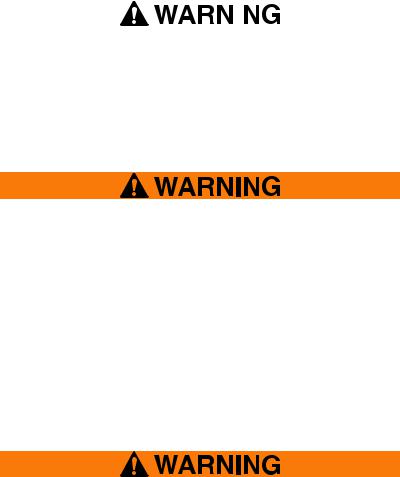
CS-310 |
SAFETY |
|
|
|
|
|
|
|
|
Periodically Check fuel system (fuel lines, vent, grommet, fuel tank, and fuel cap) for leaks especially if the unit is dropped. If damage or leaks are found, do not use unit, otherwise serious personal injury or property damage may occur. Have unit repaired by an authorized servicing dealer before using.
Personal Condition and Safety Equipment
Users of this product risk injury to themselves and others if the unit is used improperly and/or safety precautions are not followed. Proper clothing and safety gear must be worn when operating unit.
Physical Condition
Your judgment and physical dexterity may not be good:
•If you are tired or sick.
•If you are taking medication.
•If you have taken alcohol or drugs.
Operate unit only if you are physically and mentally well.
Eye Protection
Eye protection that meets ANSI Z87.1 or CE requirements must be worn whenever you operate the unit.
For additional safety, a full-face shield may be worn over safety glasses or goggles to provide protection from sharp branches or flying debris.
Hand Protection
Wear sturdy, no-slip, rubber work gloves to improve your grip on the handles. Gloves also provide protection against cuts and scratches, cold environments, and reduce the transmission of machine vibration to your hands.
X7503275300 |
|
11 |
© 1/2017 ECHO Inc.

SAFETY |
CS-310 |
|
|
Hearing/Ear Protection
ECHO recommends wearing hearing protection whenever unit is used.
Breathing Protection
Operators who are sensitive to dust or other common airborne allergens may need to wear a dust mask to prevent inhaling these materials while operating unit. Dust masks can provide protection against dust, plant debris, and other plant matter such as pollen. Make sure the mask does not impair your vision, and replace the mask as needed to prevent air restrictions.
Proper Clothing
Wear snug-fitting, durable clothing:
•Pants should have long legs, shirts should have long sleeves.
•DO NOT WEAR SHORTS.
•DO NOT WEAR TIES, SCARVES, JEWELRY, or clothing with loose or hanging items that could become entangled in moving parts or surrounding growth.
•Keep clothing buttoned or zipped, and keep shirt tails tucked in.
Wear sturdy work shoes with nonskid rubber soles:
•DO NOT WEAR OPEN TOED SHOES.
•DO NOT OPERATE UNIT BAREFOOTED.
Keep long hair away from engine and air intake. Retain hair with cap or net.
Heavy protective clothing can increase operator fatigue, which may lead to heat stroke. Schedule heavy work for early morning or late afternoon hours when temperatures are cooler.
The components of this machine generate an electromagnetic field during operation, which may interfere with some pacemakers. To reduce the risk of serious or fatal injury, persons with pacemakers should consult with their physician and the pacemaker manufacturer before operating this machine. In the absence of such information, ECHO does not recommend the use of this machine by anyone who has a pacemaker.
12 |
|
X7503275300 |
© 1/2017 ECHO Inc.
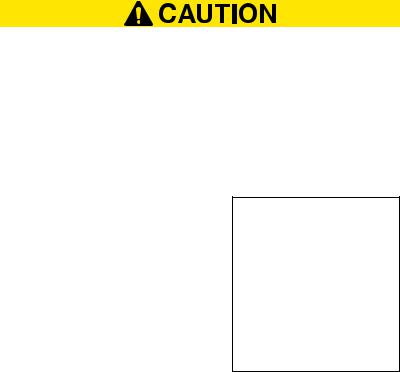
CS-310 |
SAFETY |
|
|
Extended Operation / Extreme Conditions
Prolonged exposure to cold and/or vibration may result in injury. Read and follow all safety and operation instructions to minimize risk of injury. Failure to follow instructions may result in painful wrist/hand/arm injuries.
It is believed that a condition called Raynaud’s Phenomenon, which affects the fingers of certain individuals, may be brought about by exposure to vibration and cold. Exposure to vibration and cold may cause tingling and burning sensations, followed by loss of color and numbness in the fingers. The following precautions are strongly recommended, because the minimum exposure, which might trigger the ailment, is unknown.
•Keep your body warm, especially the head, neck, feet, ankles, hands, and wrists.
•Maintain good blood circulation by performing vigorous arm exercises during frequent work breaks, and also by not smoking.
•Limit the hours of operation. Try to fill each day with jobs where operating the unit or other hand-held power equipment is not required.
•If you experience discomfort, redness,
and swelling of the fingers followed by whitening and loss of feeling, consult your physician before further exposing yourself to cold and vibration.
X7503275300 |
|
13 |
© 1/2017 ECHO Inc.
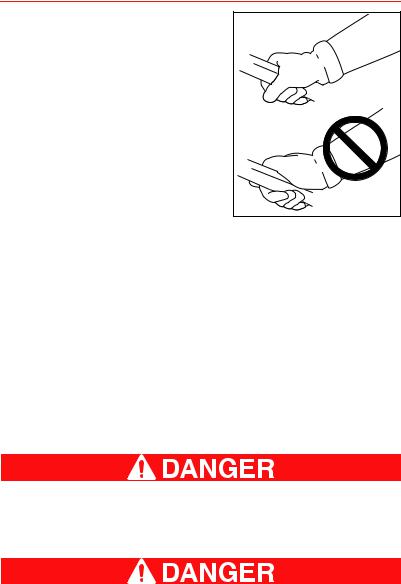
SAFETY |
CS-310 |
Repetitive Stress Injuries (RSI) |
|
It is believed that overusing the muscles |
|
and tendons of the fingers, hands, arms, |
|
and shoulders may cause soreness, |
|
swelling, numbness, weakness, and |
|
extreme pain in those areas. Certain |
|
repetitive hand activities may put you at a |
|
high risk for developing a Repetitive |
|
Stress Injury (RSI). An extreme RSI |
|
condition is Carpal Tunnel Syndrome |
|
(CTS), which could occur when your wrist |
|
swells and squeezes a vital nerve that |
|
runs through the area. Some believe that |
|
prolonged exposure to vibration may |
|
contribute to CTS. CTS can cause severe |
|
pain for months or even years. |
|
To reduce the risk of RSI/CTS, do the following:
•Avoid using your wrist in a bent, extended, or twisted position. Instead try to maintain a straight wrist position. Also, when grasping, use your whole hand, not just the thumb and index finger.
•Take periodic breaks to minimize repetition and rest your hands.
•Reduce the speed and force with which you do the repetitive movement.
•Do exercises to strengthen the hand and arm muscles.
•Immediately stop using all power equipment and consult a doctor if you feel tingling, numbness, or pain in the fingers, hands, wrists, or arms. The sooner RSI/CTS is diagnosed, the more likely permanent nerve and muscle damage can be prevented.
All over head electrical conductors and communications wires can have electricity flow with high voltages. This unit is not insulated against electrical current. Never touch wires directly or indirectly, otherwise serious injury or death may result.
Do not operate this product indoors or in inadequately ventilated areas. Engine exhaust contains poisonous emissions and can cause serious injury or death.
14 |
|
X7503275300 |
© 1/2017 ECHO Inc.
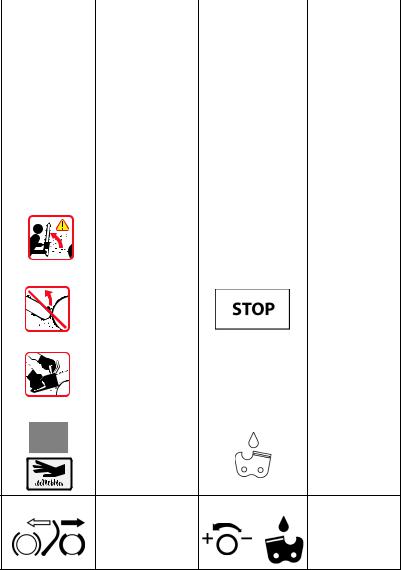
CS-310 |
|
|
SAFETY |
||
|
|
|
|
|
|
International Symbols |
|
|
|||
|
|
|
|
|
|
Symbol |
Description |
Symbol |
Description |
||
|
|
|
|
|
|
|
|
|
WARNING! |
|
|
|
|
|
Read and follow |
|
|
|
|
|
all safety |
|
|
|
|
|
precaution in the |
|
Carburetor |
|
|
|
instruction |
|
Adjustment - |
|
|
|
manual. Failure to |
|
High Speed |
|
|
|
follow instructions |
|
Mixture |
|
|
|
could result in |
|
|
|
|
|
serious personal |
|
|
|
|
|
injury. |
|
|
|
|
|
|
|
|
|
|
|
Wear Eye, Ear |
|
Carburetor |
|
|
|
and Head |
|
Adjustment - Idle |
|
|
|
Protection |
|
Speed |
|
|
|
|
|
|
|
|
|
Tip contact may |
|
|
|
|
|
cause the guide |
|
Carburetor |
|
|
|
bar to move |
|
|
|
|
|
|
Adjustment - |
|
|
|
|
suddenly upward |
|
|
|
|
|
|
Low Speed |
|
|
|
|
and backward, |
|
|
|
|
|
|
Mixture |
|
|
|
|
which may cause |
|
|
|
|
|
|
|
|
|
|
|
serious injury |
|
|
|
|
|
|
|
|
|
|
|
Contact of the |
|
|
|
|
|
guide bar tip with |
|
Emergency Stop |
|
|
|
any object should |
|
|
|
|
|
|
|
|
|
|
|
be avoided |
|
|
|
|
|
|
|
|
|
|
|
Both of the |
|
|
|
|
|
operator’s hands |
|
Fuel and Oil |
|
|
|
must be used to |
|
|
|
|
|
|
Mixture |
|
|
|
|
operate the chain |
|
|
|
|
|
|
|
|
|
|
|
saw |
|
|
|
|
|
|
|
|
|
|
|
Hot Surface |
|
Chain Oil Fill |
|
|
|
|
|
|
Chain Brake |
Chain Oiler |
Operation |
Adjustment |
X7503275300 |
|
15 |
© 1/2017 ECHO Inc.
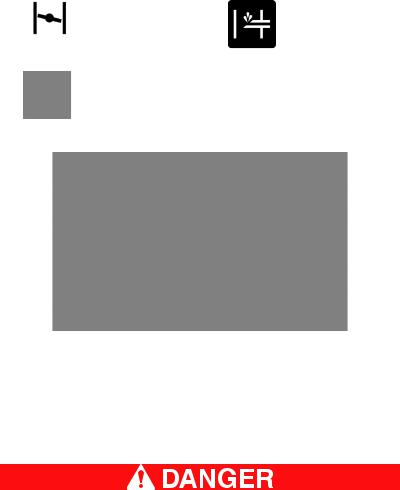
SAFETY |
|
|
CS-310 |
|
|
|
|
|
|
|
|
Symbol |
Description |
Symbol |
Description |
|
|
|
|
|
Choke Control |
|
|
|
“COLD START” |
|
Purge Pump |
|
Position (Choke |
|
|
|
|
|
|
|
Closed) |
|
|
|
|
|
|
|
Measured |
|
|
|
maximum |
|
|
|
kickback value, |
|
|
|
without brake, for |
|
|
|
approved bar and |
|
|
|
chain |
|
|
|
combinations. |
|
|
|
|
|
|
Manual Safety Symbols and Important Information
Throughout this manual and on the product itself, you will find safety alerts and helpful, informational messages preceded by symbols or key words. The following is an explanation of those symbols and key words and what they mean to you.
The safety alert symbol accompanied by the word “DANGER” calls attention to an act or condition which WILL lead to serious personal injury or death if not avoided.
16 |
|
X7503275300 |
© 1/2017 ECHO Inc.
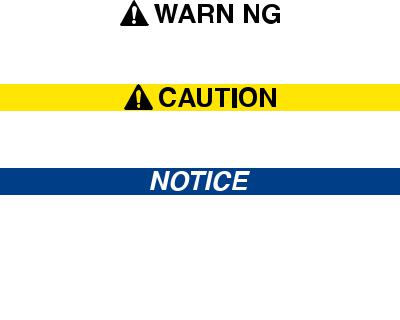
CS-310 |
SAFETY |
|
|
|
|
|
|
|
|
The safety alert symbol accompanied by the word “WARNING” calls attention to an act or condition which CAN lead to serious personal injury or death if not avoided.
The safety alert symbol accompanied by the word “CAUTION” calls attention to an act or condition which may lead to minor or moderate personal injury if not avoided.
The enclosed message provides information necessary for the protection of the unit.
Note: This enclosed message provides tips for use, care and maintenance of the unit.
CIRCLE AND SLASH SYMBOL
This symbol means the specific action shown is prohibited. Ignoring these prohibitions can result in serious or fatal injury.
X7503275300 |
|
17 |
© 1/2017 ECHO Inc.
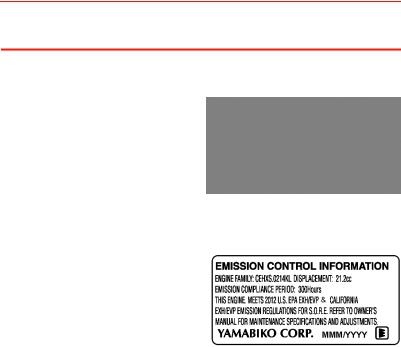
EMISSION CONTROL |
CS-310 |
EMISSION CONTROL (EXHAUST & EVAPORATIVE)
CARB And EPA Emissions Control Information
The emission control system for the engine is EM (engine modification) and, if the second to last character of the Engine Family on the Emission Control Information label (sample below) is “B”, “C”, “K”, or “T”, the emission control system is EM and TWC (3-way catalyst). The fuel tank/
fuel line emission control system is EVAP (evaporative emissions). Evaporative emissions for California models are only applicable to fuel tanks.
An Emission Control Label is located on the engine. (This is an EXAMPLE ONLY, information on label varies by engine FAMILY).
Product Emission Durability
(Emission Compliance Period)
The 50 or 300 hour emission compliance period is the time span selected by the manufacturer certifying the engine emissions output meets applicable emissions regulations, provided that approved maintenance procedures are followed as listed in the Maintenance Section of this manual.
18 |
|
X7503275300 |
© 1/2017 ECHO Inc.
